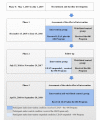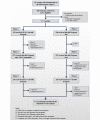Mobile Texting and Lay Health Supporters to Improve Schizophrenia Care in a Resource-Poor Community in Rural China (LEAN Trial): Randomized Controlled Trial Extended Implementation
- PMID: 33258788
- PMCID: PMC7738261
- DOI: 10.2196/22631
Mobile Texting and Lay Health Supporters to Improve Schizophrenia Care in a Resource-Poor Community in Rural China (LEAN Trial): Randomized Controlled Trial Extended Implementation
Abstract
Background: Schizophrenia is a severe and disabling condition that presents a dire health equity challenge. Our initial 6-month trial (previously reported) using mobile texting and lay health supporters, called LEAN, significantly improved medication adherence from 0.48 to 0.61 (adjusted mean 0.11, 95% CI 0.03 to 0.20, P=.007) for adults with schizophrenia living in a resource-poor village in rural China.
Objective: We explored the effectiveness of our texting program in improving participants' medication adherence, functioning, and symptoms in an extended implementation of the intervention after its initial phase.
Methods: In an approximated stepped-wedge wait-list design randomized controlled trial, 277 community-dwelling villagers with schizophrenia were assigned 1:1 in phase 1 into intervention and wait-list control groups. The intervention group received (1) lay health supporters (medication or care supervisors), (2) e-platform (mobile-texting reminders and education message) access, (3) a token gift for positive behavioral changes, and (4) integration with the existing government community-mental health program (the 686 Program) while the wait-listed control group initially only received the 686 Program. Subsequently (in the extended period), both groups received the LEAN intervention plus the 686 Program. The primary outcome was antipsychotic medication adherence (percentage of dosages taken over the past month assessed by unannounced home-based pill counts). The secondary outcomes were symptoms measured during visits to 686 Program psychiatrists using the Clinical Global Impression scale for schizophrenia and functioning measured by trained student assessors using the World Health Organization Disability Assessment Schedule 2.0. Other outcomes included data routinely collected in the 686 Program system (refill records, rehospitalization due to schizophrenia, death for any reason, suicide, wandering, and violent behaviors). We used intention-to-treat analysis and missing data were imputed. A generalized estimating equation model was used to assess program effects on antipsychotics medication adherence, symptoms, and functioning.
Results: Antipsychotics medication adherence improved from 0.48 in the control period to 0.58 in the extended intervention period (adjusted mean difference 0.11, 95% CI 0.04 to 0.19; P=.004). We also noted an improvement in symptoms (adjusted mean difference -0.26, 95% CI -0.50 to -0.02; P=.04; Cohen d effect size 0.20) and a reduction in rehospitalization (0.37, 95% CI 0.18 to 0.76; P=.007; number-needed-to-treat 8.05, 95% CI 4.61 to 21.41). There was no improvement in functioning (adjusted mean difference 0.02, 95% CI -0.01 to 0.06; P=.18; Cohen d effect size 0.04).
Conclusions: In an extended implementation, our intervention featuring mobile texting messages and lay health workers in a resource-poor community setting was more effective than the 686 Program alone in improving medication adherence, improving symptoms, and reducing rehospitalization.
Trial registration: Chinese Clinical Trial Registry; ChiCTR-ICR-15006053 https://tinyurl.com/y5hk8vng.
Keywords: lay health worker; mHealth; medication adherence; mobile texting; primary health care; quality of care; resource-poor community; schizophrenia.
©Yiyuan Cai, Wenjie Gong, Hua He, James P Hughes, Jane Simoni, Shuiyuan Xiao, Stephen Gloyd, Meijuan Lin, Xinlei Deng, Zichao Liang, Wenjun He, Bofeng Dai, Jing Liao, Yuantao Hao, Dong (Roman) Xu. Originally published in the Journal of Medical Internet Research (http://www.jmir.org), 01.12.2020.
Conflict of interest statement
Conflicts of Interest: None declared.
Figures
Similar articles
-
Residual Effect of Texting to Promote Medication Adherence for Villagers with Schizophrenia in China: 18-Month Follow-up Survey After the Randomized Controlled Trial Discontinuation.JMIR Mhealth Uhealth. 2022 Apr 19;10(4):e33628. doi: 10.2196/33628. JMIR Mhealth Uhealth. 2022. PMID: 35438649 Free PMC article. Clinical Trial.
-
Lay health supporters aided by mobile text messaging to improve adherence, symptoms, and functioning among people with schizophrenia in a resource-poor community in rural China (LEAN): A randomized controlled trial.PLoS Med. 2019 Apr 23;16(4):e1002785. doi: 10.1371/journal.pmed.1002785. eCollection 2019 Apr. PLoS Med. 2019. PMID: 31013275 Free PMC article. Clinical Trial.
-
Lay health supporters aided by a mobile phone messaging system to improve care of villagers with schizophrenia in Liuyang, China: protocol for a randomised control trial.BMJ Open. 2016 Jan 20;6(1):e010120. doi: 10.1136/bmjopen-2015-010120. BMJ Open. 2016. PMID: 26792221 Free PMC article. Clinical Trial.
-
Electroconvulsive therapy for treatment-resistant schizophrenia.Cochrane Database Syst Rev. 2019 Mar 19;3(3):CD011847. doi: 10.1002/14651858.CD011847.pub2. Cochrane Database Syst Rev. 2019. PMID: 30888709 Free PMC article.
-
Psychological interventions for improving adherence to inhaled therapies in people with cystic fibrosis.Cochrane Database Syst Rev. 2023 Mar 29;3(3):CD013766. doi: 10.1002/14651858.CD013766.pub2. Cochrane Database Syst Rev. 2023. PMID: 36989170 Free PMC article. Review.
Cited by
-
Barriers and Facilitators of User Engagement With Digital Mental Health Interventions for People With Psychosis or Bipolar Disorder: Systematic Review and Best-Fit Framework Synthesis.JMIR Ment Health. 2025 Jan 20;12:e65246. doi: 10.2196/65246. JMIR Ment Health. 2025. PMID: 39832352 Free PMC article.
-
Leveraging Personal Technologies in the Treatment of Schizophrenia Spectrum Disorders: Scoping Review.JMIR Ment Health. 2024 Sep 30;11:e57150. doi: 10.2196/57150. JMIR Ment Health. 2024. PMID: 39348196 Free PMC article.
-
Randomized clinical trial of a digital medication system to enhance adherence in patients with severe mental disorders.NPJ Digit Med. 2025 Jun 5;8(1):333. doi: 10.1038/s41746-025-01748-2. NPJ Digit Med. 2025. PMID: 40467762 Free PMC article.
-
Residual Effect of Texting to Promote Medication Adherence for Villagers with Schizophrenia in China: 18-Month Follow-up Survey After the Randomized Controlled Trial Discontinuation.JMIR Mhealth Uhealth. 2022 Apr 19;10(4):e33628. doi: 10.2196/33628. JMIR Mhealth Uhealth. 2022. PMID: 35438649 Free PMC article. Clinical Trial.
-
Systematic Literature Review of Text Messaging Interventions to Promote Medication Adherence Among People With Serious Mental Illness.Psychiatr Serv. 2022 Oct 1;73(10):1153-1164. doi: 10.1176/appi.ps.202100634. Epub 2022 Aug 12. Psychiatr Serv. 2022. PMID: 35959534 Free PMC article.
References
-
- Leucht S, Cipriani A, Spineli L, Mavridis D, Örey D, Richter F, Samara M, Barbui C, Engel RR, Geddes JR, Kissling W, Stapf MP, Lässig B, Salanti G, Davis JM. Comparative efficacy and tolerability of 15 antipsychotic drugs in schizophrenia: a multiple-treatments meta-analysis. The Lancet. 2013 Sep;382(9896):951–962. doi: 10.1016/S0140-6736(13)60733-3. - DOI - PubMed
-
- Iasevoli F, Giordano S, Balletta R, Latte G, Formato MV, Prinzivalli E, De Berardis D, Tomasetti C, de Bartolomeis A. Treatment resistant schizophrenia is associated with the worst community functioning among severely-ill highly-disabling psychiatric conditions and is the most relevant predictor of poorer achievements in functional milestones. Prog Neuropsychopharmacol Biol Psychiatry. 2016 Feb 04;65:34–48. doi: 10.1016/j.pnpbp.2015.08.010. - DOI - PubMed
-
- Goff DC, Hill M, Freudenreich O. Strategies for improving treatment adherence in schizophrenia and schizoaffective disorder. J Clin Psychiatry. 2010;71 Suppl 2:20–6. doi: 10.4088/JCP.9096su1cc.04. http://www.psychiatrist.com/jcp/article/pages/2010/v71s02/v71s0204.aspx - DOI - PubMed
-
- mhGAP Mental Health Gap Action Programme—scaling up care for mental, neurological and substance use disorders. World Health Organization. [2020-09-23]. https://www.who.int/mental_health/mhgap_final_english.pdf?ua=1. - PubMed
Publication types
MeSH terms
Associated data
Grants and funding
LinkOut - more resources
Full Text Sources
Medical
Miscellaneous




